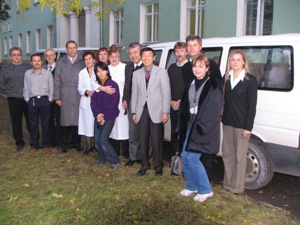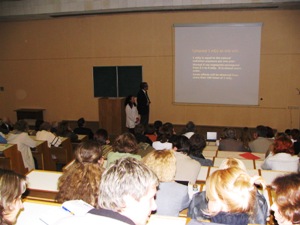Dispatch of Medical Professionals
Home > Dispatch of Medical Professionals > Dispatch List > HICARE Medical Mission to Belarus
HICARE Medical Mission to Belarus
HICARE dispatched a delegation to Belarus for the following purposes:
・Medical checks for the patients in Vicebck
・The conduction of a lecture conference in Minsk.
Period:
Members:

Doctors in Belarus with Members
| Dr. Norio Takeichi | Director of the Takeichi Clinic |
| Dr. Masaharu Hoshi | Professor of the Hiroshima University Research Institute for Radiation Biology and Medicine (RIRBM) |
| Ms. Aki Mitsumoto | Takeichi Clinic Clinical examination technician |
| Mr. Yuh Terashima | Secretary General of the Assistance Movement to Chernobyl in Kyushu |
| Ms. Marina Chikina | Russian Interpreter |
| Dr. Hideo Yamada | Russian Medical Interpreter and coordinator of the mission |
Outline & Impressions:
Medical Examination at Vicebck State Endocrine Hospital
- Present situation in areas uncontaminated by radiation -
Vicebck, known for being the birthplace of famed impressionist Marc Chagall, is situated nearby Russia, located 350 km NE of Minsk, the capital of Belarus. The main purpose of our mission was the controlled investigation and study of patients with thyroid cancer in areas uncontaminated by radiation. Thyroid cancer examinations for 59 patients took place over two days. Lead by Dr. Takeichi, two more groups participated: doctors from the Endocrine Clinic of the Brest State Malignant Tumor Hospital, and doctors from the Mobile Diagnostic Laboratory (MDL) of the International Federation of the Red Cross, a group who has studied aspiration biopsy, staining, and other related methods for the past 7 years. The samples acquired by biopsy aspiration were stained by the staff and kept at the Endocrine Clinic. As a general goal, we always attempt to inform the patients of their exam results before our departure.
Dr. Galina, Director of the Vicebck State Endocrine Hospital, told us:
"We are deeply excited by and interested in the check-up activity practiced by both MBL and the Japanese doctors. Vicebck City, unlike Brest, is designated as uncontaminated by radiation, and thus has no special examination team receiving sponsorship from NGO’s, the Red Cross, or the national government. There are, however, about 22,000 people living in Vicebck State who were evacuated from radiation contaminated areas. These people have a high risk of diseases related to the endocrine system, such as thyroid disease and diabetes. Additionally, a large number of these individuals live in rural regions where medical facilities are insufficient. In short, in uncontaminated areas medical treatment for radiation-exposed patients tends to be slow. We would like to thank all the Japanese experts for their examinations and expertise. Having seen that the MDL team in Brest can cooperate with Japanese medical experts, we would like to form a similar MDL in collaboration with the Health Care Bureau of the State government. Although our MDL may not be technologically or medically equivalent to Brest’s, we nonetheless hope to establish as efficient a system. To the members of the visiting delegation: we would very much like to continue our good relationship from now long into the future.”
Cooperation with the MDL from the Endocrine Clinic of the Brest State Malignant Tumor Hospital:
Four doctors from the MDL team helped us with the medical examinations in Vicebck. The doctors were invited by either HICARE or the Hiroshima Red Cross Hospital and had received training at hospitals or institutes within Hiroshima. MDL lent us the necessary medical equipment, ultrasonography, microscope, and staining sets, etc., which were brought from Brest, almost 1,000 kilometers away from Vicebck. Thanks to their cooperation, we were able to quickly carry out a series of medical examinations and procedures: medical interviews, hand-on examinations, urine and blood sampling, ultrasonography, aspiration biopsy, staining, fixing of samples, and final slide preparation. During our examinations, Dr. Artur, a member of the MDL from Brest, explained Dr. TAKEICHI’s ultrasonography and aspiration biopsy techniques to the doctors from Vicebck; it was their first time participating in such examination procedures. Dr. Vladimir also played a leading role in the creation of a database of patients' medical records, as well as conducting examinations of patients by touch.
The MDL was formed in 1995 in the radiation-contaminated areas of Gomel, Mogilev, and Brest. Among those, the MDL team from Brest was particularly proactive from the outset of the program, learning aspiration biopsy and other related techniques from Japanese doctors directly. Having received medical training from HICARE as well as the Hiroshima Red Cross Hospital & Atomic-bomb Survivors Hospital, they are highly regarded for their fine medical skills, trustworthy diagnosis, and establishment of an efficient medical check-up system. Their activities are regarded as a model for the health care of radiation patients in Belarus; furthermore, their skills and talents steadily improve with time. For the doctors in Vicebck, this was an important opportunity to exchange ideas with the Brest MDL. Both groups promised further mutual cooperation.
International Medical Symposium:
On October 29, 2005, an international medical symposium was held at the Minsk Hospital #10, lead by Dr. Larisa Danilova, Professor of the Endocrine Laboratory of the Minsk University Graduate Medical Academy. This was the 4th symposium, with previous events in 1998, 1999 and 2000. During the symposium, we received addresses from Mr. Yoshiro Morino, Japanese Ambassador to Belarus, as well as from Dr. Anton Romanovsky, Secretary General of the Belarusian Red Cross Republican Committee, and Dr. Danilova. Mr. Morino expressed his appreciation for the mutual cooperation between Japan and Belarus: "I am pleased to hear that there exists mutual cooperation between Japan and Belarus. I believe that our continuous and steady efforts supporting Belarusian patients will remain in the minds and hearts of the local people. As a representative of Japanese government, I would like to deeply thank everyone conducting these activities.
Subsequently, Dr. Hoshi, professor of RIRBM, delivered two lectures concerning studies and investigations since 1994: "Radiation Medicine" and "Radiation Dosimetry in Chernobyl and Semipalatinsk.”
Dr. Norio Takeichi also delivered a lecture concerning "Symptoms and Diagnosis of Thyroid Disease.” The charts published by the Hiroshima Medical Association were distributed to the audience; many of the participants took notes while listening diligently to the lecture. A number of participants inquired about operation techniques during the question session.

Lecture Scene
Closing:
We feel that many long-term goals are being steadily achieved through the mutual cooperation among doctors in Japan, Belarus, as well as the staffs of the Belarusian Red Cross. Via our support projects occurring since 1991, we would like to further develop a relationship of mutual trust, tackling more and more regional medical issues and challenges.
Lastly, we would like to show our appreciation to HICARE for its support of our visit to Belarus. Thanks to their aid, we can more effectively and efficiently implement of our medical activities.



